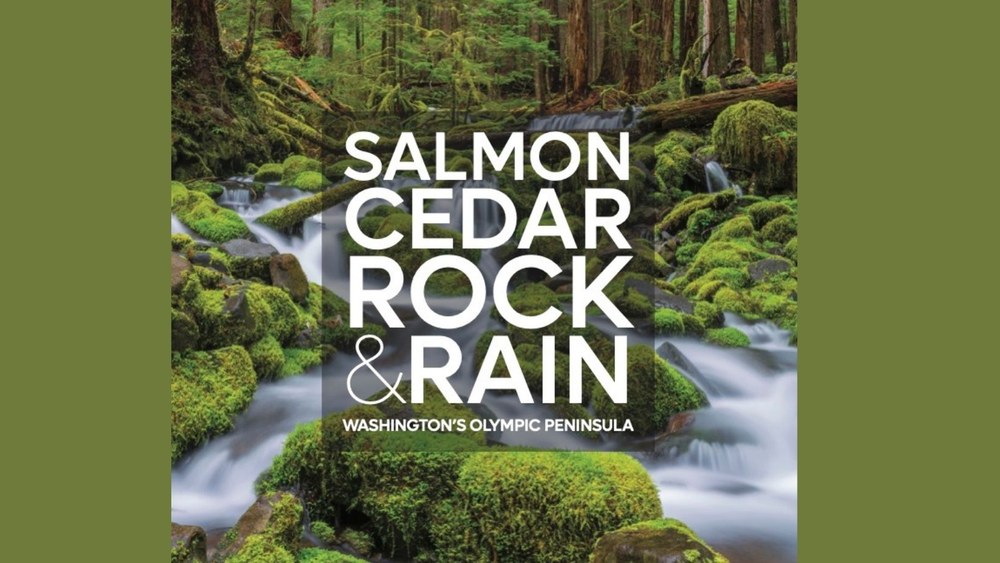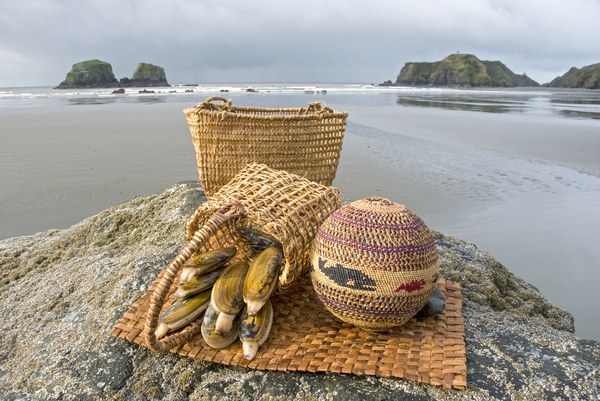
For tens of thousands of years, humans have thrived and strived alongside the natural world, protecting it for future generations of life. While protecting the forests, mountains, and coastlines of the Olympic Peninsula was one of The Mountaineers first conservation priorities, Native peoples have stewarded the lands, waters, and wildlife of the Olympic Peninsula since time immemorial. Today, Olympic National Park is at the center of a much larger ecosystem: a wild circle of rivers that encompasses ancient old-growth forests, pristine coastal expanses, and jagged alpine peaks, all possessed of rich biodiversity.
Braided River's newest book, Salmon, Cedar, Rock & Rain: Washington's Olympic Peninsula, immerses the reader in the culture and beauty of the Peninsula, from Native and settler storytellers who each share and cherish this stunning place they all call home. In this excerpt from the book, Lower Elwha Klallam Tribal Elder and Klallam language teacher Jamie R. Valadez shares some of the ways her community has been working to conserve the famous Elwha River, preserve and restore Native language, and share their spiritual stories of relationship to the land.
From the essay “Klallam̕ Mountains” or “nəxwsƛáy̕əm̕ sx̣əy̕kwəy̕éʔč” by Jamie R. Valadez, Lower Elwha Klallam Tribe
Our ancestors made sure they passed down the history and traditional knowledge of the Klallam Mountains. It was their hope and dream that someday their descendants would once again return to the backwoods. As Elwha River restoration was ramping up, tribal programs were being established to reintroduce the Klallam people to the mountains where our Ancestors fished, hunted, and gathered:
- A group of tribal youth from the Lower Elwha Klallam Tribe hiked the Low Divide from the Elwha River to Quinault in 2002. That was the year Quinault was hosting the annual Canoe Journeys. Along the way, the youth renamed ancient seasonal camps in Klallam, and so sčiʔanəŋáw̕txw (Place of Our Ancestors) became the name for Lillian River; sməyəcáw̕txw (Place of the Elk) became the name for Elkhorn; sx̣əykwəy̕éʔč spə́ɬx̣ən (Place of the Mountain Meadow) became the name for Hayes; čə́q sqiqəyáyŋəxw (Place of the Big Trees) became the name for Chicago Camp; and ʔəsq̕apɬáw̕txw (Gathering Place) became the name of Low Divide.
- Every summer since 2005, a camp has been held for our youth at NatureBridge, a natural science center located on Lake Crescent. The youth learn about the Elwha River restoration as well as traditional knowledge about the mountains by hiking the trails to sacred places and seasonal camps.
- The Creation Site was found in 2012 as Lake Aldwell was drained. Tribal members began to revive the tradition of hiking to the Creation Site as part of their vision quest experience.
- Since the restoration, it has been difficult to hike along the Elwha River, so groups began to hike to other places in the mountains such as Obstruction Point and both Olympic Hot Springs and Sol Duc Hot Springs.
- Quinault hosted Canoe Journeys again in 2013, when another group of youth experienced the hike from Elwha to Quinault.
- In 2014 a group hiked the Seven Lakes Basin Loop, and some of the hikers went on to hike to Boston Charlie’s Camp.
Along with the successful restoration of the Elwha River, the Klallam people have also restored their relationship with the Klallam Mountains. Along the way, they learned about their Ancestors and the teachings and traditional knowledge that they passed down about the Olympic Mountains. What follows is some of this oral history.
Creation Site
The Klallam people were created on the Elwha River at a place where a rock formation is shaped like a coil basket, called spčúʔ. Our very beginning came from this coiled basket, shaped within the rock, where dirt was scooped and out of which the human race was formed. All of the tribes of this region were created at this sacred place on the Elwha River. This is where the Creator, known as x̣áy̕əs, bathed the first people and blessed them. This is now where our people go on their vision quests. If a man thrusts his hand into the water there and brings out deer hair, for example, he knows he will be a good hunter.
Vision Quest
Every day the Klallam people bathed in the Elwha River, but when they went on their vision quests, they went to the Olympic Hot Springs or Sol Duc Hot Springs to purify themselves and receive spiritual guidance.
Spirit power came from living things, natural objects, natural forces, monsters, and even handmade objects on rare occasions. Training for going on a vision quest began when children were small; they would be instructed to bathe and scrub in icy water and to go out on dark and stormy nights. As the children neared puberty, they began fasting. When an individual was “clean,” the spirit power would come to them. The spirit gave a song to its new owner that brought their power into force—the song itself was a spiritual or physical entity.
When a person returned from a spirit quest, that individual kept the event quiet for a year until the spirit was revealed at the next potlatch and their spirit song was sung.
Guardian spirits visited their owners once a year. When the power came, the person became ill. Instead of calling a shaman in, the Klallam called in friends to help sing their spirit songs for several days, until the spirit was satisfied and left. The only difference between a shaman’s power and that of a layperson was the way in which power was acquired. The spirit power provided a form of wealth that would bring prestige to the individual. Although spirit acquisition was a personal achievement, the benefits were often shared by the village. The halibut spirit, for example, could make fish come to the shore so that all of the village could acquire them. The thunderbird spirit was the strongest spirit, and the most difficult to obtain. A warrior with this spirit power for war could shoot lightning into another person.
Jamie R. Valades is a Lower Elwha Klallam Tribal Member, a retired teacher of Klallam Language and Native American History. She will be speaking as a part of the Salmon, Cedar, Rock & Rain Peninsula launch event October 20 at the Port Angeles Library. Find a Salmon, Cedar, Rock & Rain event near you - and if you’re in the Seattle area, consider attending Braided River’s special launch event at Town Hall Seattle on Oct 23.

Native Baskets with razor clams on a coastal beach on the olympic Peninsula. Photo by Larry Workman.
Protecting the Wild Olympics
The Mountaineers leads many trips to the Olympics, including hiking, backpacking, and stewardship activities, and we believe that protecting these beloved areas will ensure visitors can enjoy the lush natural beauty of the Olympic Peninsula for generations to come. We also continue our longtime legacy of advocating for this iconic landscape as a part of the Wild Olympics Coalition, working to secure additional Wilderness protections for the Olympic National Forest, aligned with tribes like the Lower Elwha Klallam Tribe in our shared support of the Wild Olympics Bill.
The bill would designate the first Wilderness areas on Olympic National Forest in more than 30 years, protecting more than 126,000 acres of the Forest as Wilderness and designating 19 Wild and Scenic Rivers, including several of the places where we hike, camp, and connect to nature.
After making considerable progress in Congress over the last two years, we’re hopeful of the prospects of the Wild Olympics bill becoming law by the end of the current Congress. The next milestone for the legislation could be coming soon, as we’re urging the Senate Energy and Natural Resources Committee to pass the bill and move it along to the full Senate later this fall.
Salmon, Cedar, Rock & Rain is an inspiring book to support our ongoing advocacy, helping remind decision-makers the Olympic Peninsula is worth protecting. We'll continue to share how you can support this important initiative. Thank you for all you do to connect to, and care for, the Olympic Peninsula.
Braided River is the conservation imprint of Mountaineers Books. For more information visit www.SalmonCedar.org.
 Erika Lundahl
Erika Lundahl